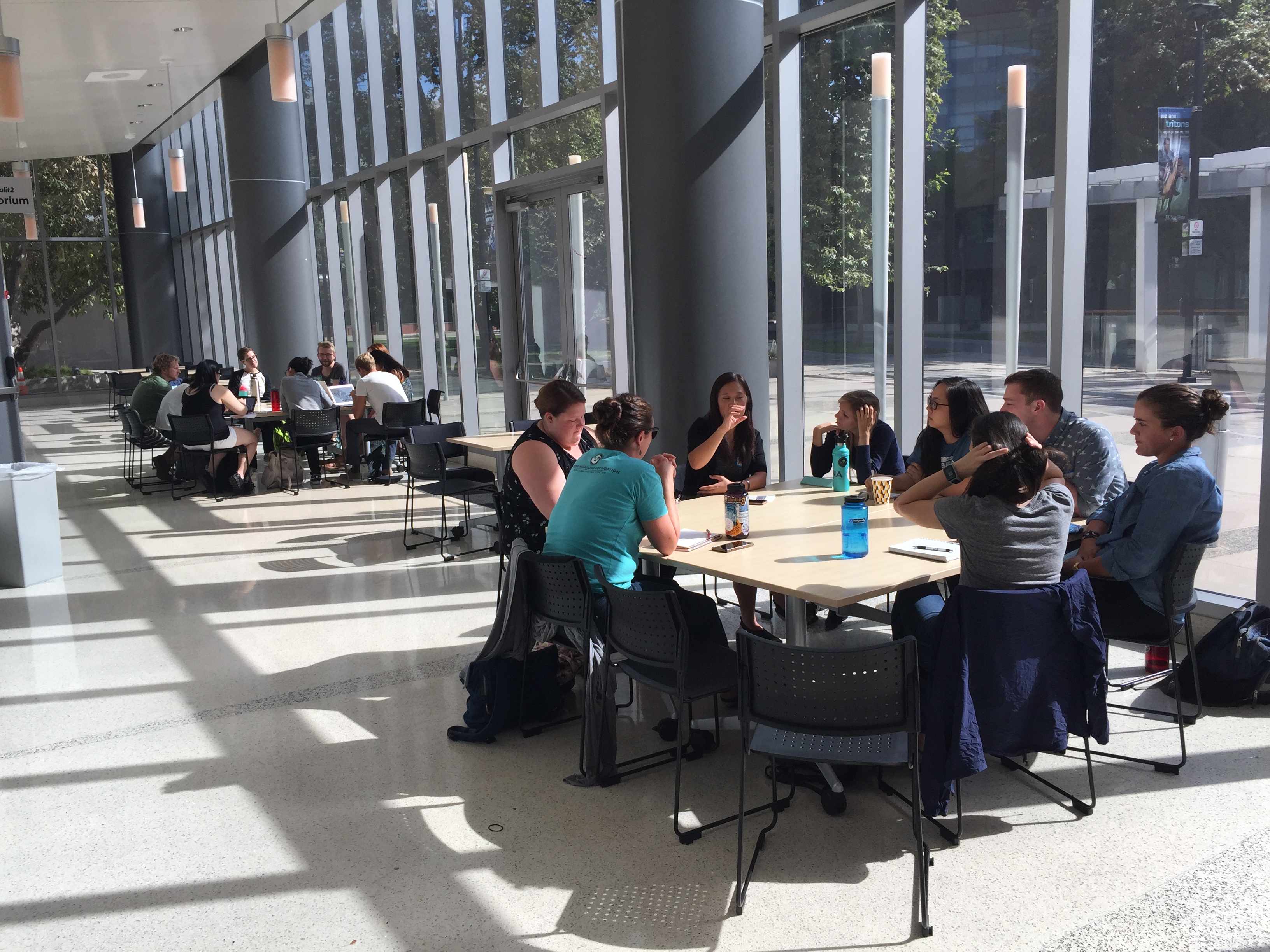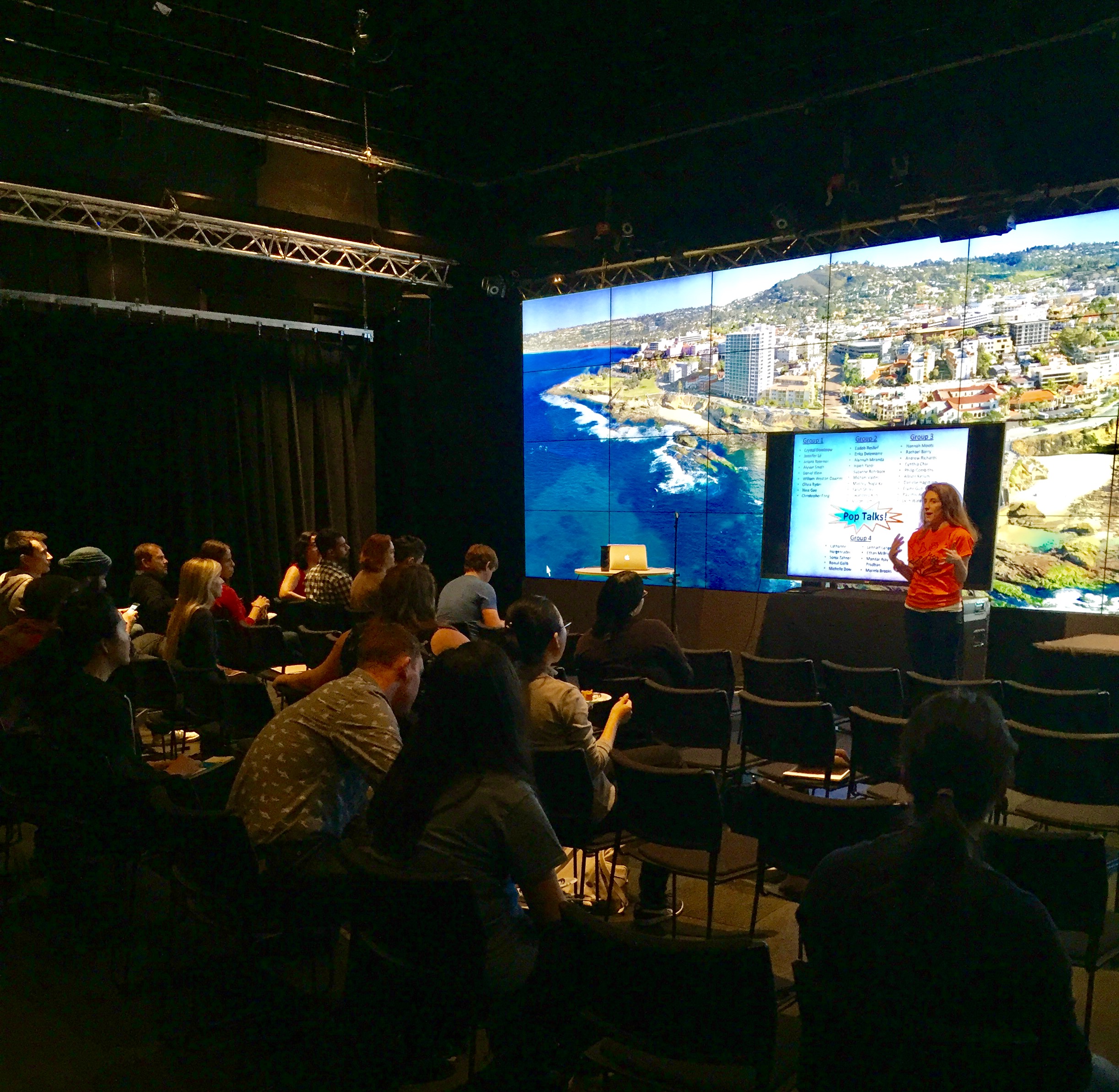Science for All: Shifting Academic Communication at ComSciCon
By Samantha H. Jones

San Diego, Calif., Sept. 26, 2017 – “Whose advisor is unhappy that they’re here today?” asked Leanne Chukoskie, an assistant research scientist at the Institute for Neural Computation at UC San Diego and an affiliate of the Qualcomm Institute. Looking around at a sea of raised hands, she continued, “Know that the act of writing clearly for the public and preparing well supported arguments is an incredibly important skill.”
San Diego’s second annual Communicating Science workshop (ComSciCon) was held September 15-16th at the University of California San Diego Qualcomm Institute, drawing researchers (primarily graduate and postdoctoral) from all over Southern California who wanted to hone their communication skills through a combination of lecture, discussion, and hands-on workshops.
"At the Qualcomm Institute, our approach is to be somewhat blind to disciplines, to do research that doesn't necessarily begin with a particular discipline as a starting point," said Ramesh Rao, director of the Qualcomm Institute. "Even if you're an engineer, for example, and you want to get into the neurosciences, here you can wade right in. But it also requires that researchers learn to communicate in other 'languages,' so to speak. Knowing the key terminology and ways of thinking in other disciplines is a pathway into that discipline."
ComSciCon began in 2013, and the first national conference—sponsored by Harvard University and Massachusetts Institute of Technology—was held in Cambridge, Massachusetts. Since then, a growing number of local ComSciCon workshops have been popping up all over the country.
The co-lead organizer of the San Diego event, Jarrett Lovelett, said ComSciCon addresses a key failing of contemporary science:
“As scientists, we are familiar with the feeling of feverish excitement at a new finding or line of research but, unfortunately, we are equally familiar with the disappointment of failing to convey that excitement to others.”
“One of the principal aims of ComSciCon,” added UCSD Neurosciences graduate student and event co-leader Catie Profaci, “is to give graduate students and postdoctoral researchers some sorely needed training in getting their audiences interested, whether that’s in presenting their work to colleagues, speaking about their research to the public, or teaching science in the classroom.”
One highlight of the conference was a panel discussion on navigating controversial topics, where the resounding theme was that scientists should be more available to the public and cognizant of their concerns, in part to prevent the dissemination of misinformation. “Work to understand why someone is concerned about a topic,” said panelist Leanne Chukoskie. “If, for instance, that person is a parent concerned about their child, don’t make their child a statistic or number.”
The ability to connect, one human to another, is essential before starting any conversation. “We need to bring humanness to what we do and study. We need to make those connections with the public,” stressed Dona Mapston, director of the Salk Education Outreach programs. “Find out what people fear and have questions about and then let them know ‘Yes, I’m a scientist, but I’m also someone who sees a bigger picture for humanity.’”
Panelist Sherry Nouraini, Social Media Marketing Instructor for UC San Diego Extension, uses analogies to explain the importance of only going to experts for scientific advice. “There are many ‘internet gurus’ out there spreading pseudoscience, and so to illustrate the importance of seeking out an expert I often pose the question, ‘if your car breaks down, do you take it to the dentist to fix it or do you take it to a mechanic?’ When talking with the public, the power of analogies will save you time.” Nouraini also emphasized the importance of being able to let go. “Always be prepared for people not to accept your point of view. Sometimes you need to choose your battles.”

Chukoskie echoed a similar belief, but then added, “With groups that are extremely militant – for example, some animal activist groups—do not engage.”
When it comes to controversy, being passionate about science communication itself can be divisive. “I think many professors view science communication as a distraction from research, an extra-curricular activity eating too much of their students' time, and I wish this weren't the case,” said Profaci. “A majority of the talks I attend could be more engaging and foster productive discussion and collaboration if they were presented more clearly. Science communication is essential for advancing careers in academia too, and I hope that knowledge eventually spreads through graduate programs and research universities.”
Stephanie Fine Sasse, the CEO, co-founder and creative director of The People’s Science, delivered the workshop’s keynote lecture where she introduced tools for making science more publicly accessible. Early on in her career, Sasse witnessed the disconnect between policy makers and scientists and was bewildered by how many policies were at odds with relevant research findings. This experience, in part, led to her founding The People’s Science, a non-profit whose slogan, “Science for Everyone,” illustrates the organization’s overall goal.
“Communicating is not about scientists delivering information to the public, it's about scientists forming a relationship with the public,” explained Sasse. “When I say ‘relationship’ I mean building trust through financial, technical and psychological access.”
“Giving the public financial access means prioritizing affordability through avenues such as open source publications and volunteering time to talk with the public,” said Sasse. Technical access to scientific information requires a researcher to diversify how he or she delivers that information, through analogies or stories, for example, while using jargon wisely. “If we avoid using jargon completely, it's like telling people they don't belong,” said Sasse. “By finding the right ways to explain jargon you invite people to think critically.”
To promote psychological access, Sasse recommended making presentations dynamic and tailored to the audience, all the while finding ways to remind the audience that the presenter is not merely his or her scientist identity. “Who are you trying to reach? And who are you?” asked Sasse. “People care more about you than your work.”
Seeing an obvious lack of support for improving science communication, Sasse often found herself wondering, “How do we effect change if we have little institutional backing?” At ComSciCon, she advised attendees to speak up. “Culture never shifts without people being noisy, so be vocal! The more people normalizing science communication the better.”
One goal of an event like ComSciCon is to provide tools to researchers so that they can go off and promote effective science communication, but a major issue lies in the fact that there are still many communities not being reached. Keith Trujillo, Professor at California State University San Marcos, Daniel Aguirre, Co-Founder of the San Ysidro Education Committee, and Elizabeth Jacobs, co-chair of Public Relations and Outreach for the Association for Women in Science weighed in on how we can not only make science more diverse but make it more inclusive. Making science inclusive means creating a safe learning environment to better reach those underrepresented communities and get them interested in, and open to, learning about science. "I want all students to know that their voice has power," said Trujillo, who is passionate about all of his students feeling at home in the classroom. “We need to empower individuals to make sure we don't lose them along the way.”
Elizabeth Jacobs, co-chair of Public Relations and Outreach for the Association for Women in Science, believes that inclusivity should be a topic for discussion between colleagues or even within friend groups. “In your immediate circles, don't be afraid to help people recognize their own biases,” she said.
By the end of the conference one message was strikingly evident: The current system needs to change. In the words of panelist Leanne Chukoskie, “We need to make it clear that the survival of our research institution depends on an educated population.” This year’s ComSciCon presented a unique opportunity for researchers to address this issue, by developing the skills to advocate for, and improve, public science literacy.
Media Contacts
Tiffany Fox
(858) 246-0353
tfox@ucsd.edu
Related Links

